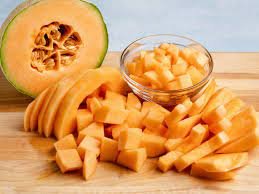Cantaloupe, known for its sweet aroma and vibrant orange flesh, is a beloved summer fruit that’s as delicious as it is nutritious. In this complete guide to cantaloupe, we’ll explore everything from its health benefits to how to choose, store, and enjoy this versatile and refreshing fruit.
Cantaloupe Nutrition: A Sweet Boost of Goodness: Cantaloupe is a nutrient powerhouse that’s low in calories and rich in vitamins, minerals, and antioxidants. It’s an excellent source of vitamin C, vitamin A (from beta-carotene), potassium, and dietary fiber. These nutrients contribute to immune support, skin health, hydration, and more.
Selecting the Perfect Cantaloupe:
- Scent Test: A ripe cantaloupe emits a sweet, fragrant aroma at the stem end. Avoid fruits with little to no scent.
- Texture: Look for a slightly firm texture without overly soft spots or wrinkles.
- Rind Color: A vibrant, golden-orange color with a slightly netted or raised appearance indicates ripeness.
Storing Cantaloupe for Optimal Freshness:
- Room Temperature: A whole, uncut cantaloupe can be kept at room temperature for a day or two.
- Refrigeration: Store ripe cantaloupe in the refrigerator’s crisper drawer for up to 5 days. If cut, cover it with plastic wrap or store in an airtight container.
Preparing and Enjoying Cantaloupe:
- Washing: Rinse the outer surface of the cantaloupe before cutting to remove dirt and bacteria.
- Cutting: Cut off the stem end and slice the cantaloupe in half. Scoop out the seeds using a spoon.
- Serving Options:
- Sliced: Enjoy fresh cantaloupe slices as a snack or part of a fruit salad.
- Smoothies: Blend cantaloupe with other fruits, yogurt, or plant-based milk for a refreshing smoothie.
- Sorbet: Freeze cantaloupe cubes and blend them for a guilt-free sorbet.
- Grilled: Try grilling cantaloupe slices for a unique twist. The heat enhances its natural sweetness.
- Juice: Blend cantaloupe chunks with water and strain for a refreshing and hydrating beverage.
Health Benefits and Culinary Versatility:
- Hydration: With its high water content, cantaloupe is an excellent hydrating option during hot months.
- Eye Health: Cantaloupe’s beta-carotene content supports healthy vision.
- Skin Radiance: Vitamins A and C promote healthy skin by supporting collagen production.
- Digestive Health: Dietary fiber aids digestion and supports a healthy gut.
- Heart Health: Potassium in cantaloupe helps regulate blood pressure and supports heart health.
Creative Cantaloupe Recipes to Try:
- Cantaloupe and Prosciutto Salad: Combine cantaloupe slices with prosciutto, arugula, and a drizzle of balsamic vinegar for a savory-sweet salad.
- Cantaloupe Salsa: Mix diced cantaloupe with red onion, jalapeno, cilantro, lime juice, and a pinch of salt for a refreshing salsa to pair with grilled dishes.
- Cantaloupe Yogurt Parfait: Layer cantaloupe cubes, Greek yogurt, and granola for a wholesome and satisfying breakfast or snack.
Conclusion: Cantaloupe’s succulent sweetness and impressive nutrient profile make it a delightful addition to any diet. Whether enjoyed on its own, blended into beverages, or incorporated into various recipes, this fruit offers both taste and health benefits. By understanding how to select, store, and prepare cantaloupe, you can savor its refreshing flavor while reaping its many nutritional rewards.
FAQs: Q1: Can I eat cantaloupe seeds? A: Yes, cantaloupe seeds are safe to eat. However, many people prefer to scoop them out before consuming the fruit.
Q2: Can cantaloupe help with weight management? A: Cantaloupe’s low calorie content and high water and fiber content make it a satisfying and weight-friendly snack.
Q3: Is it safe to consume cantaloupe during pregnancy? A: Yes, cantaloupe can be a nutritious addition to a pregnant woman’s diet. Its vitamin A and C content can be beneficial for both the mother and the developing baby.
Q4: Can I freeze cantaloupe for later use? A: Yes, you can freeze cantaloupe cubes for use in smoothies or sorbets. However, the texture may change slightly after thawing.
Q5: Can I eat the peel of a cantaloupe? A: The skin or peel of cantaloupe is generally not consumed due to its tough texture. It’s best to remove the peel before consuming the flesh.








